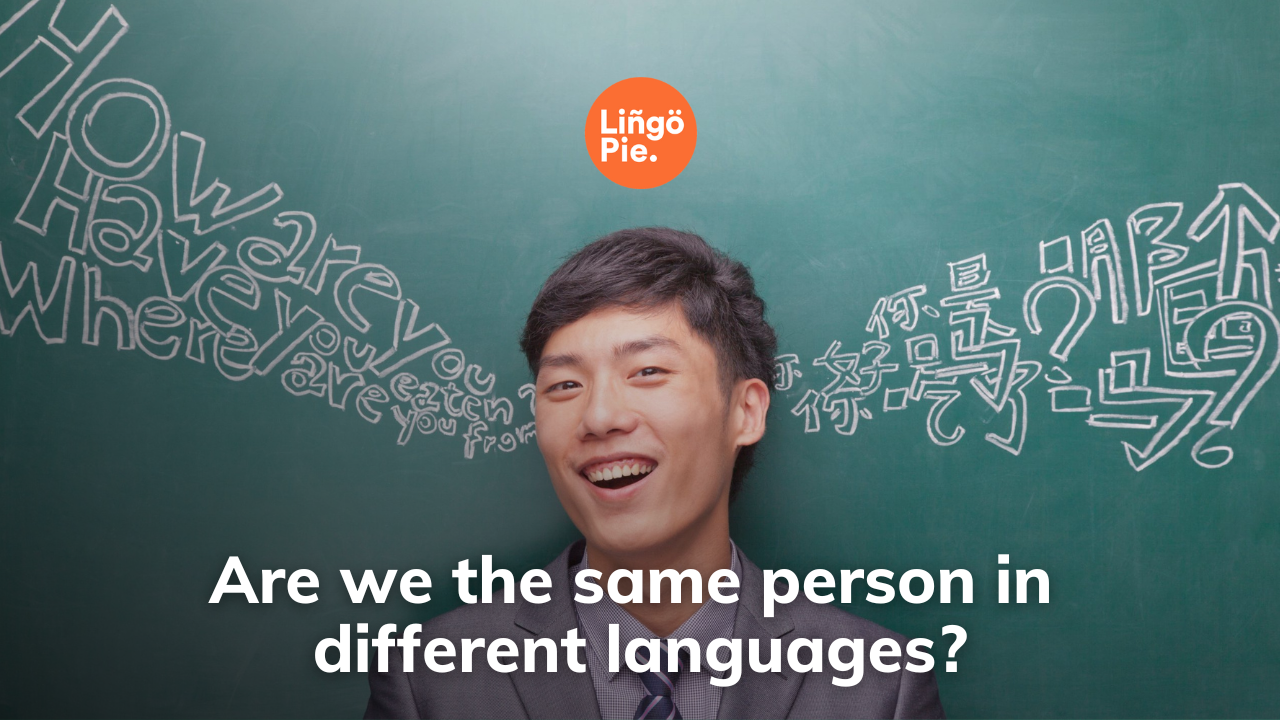Language is not only a communication tool, but also a powerful reflex capable of determining how we present ourselves and how others perceive us. With more than 7,000 languages spoken in the world today, it is interesting to consider how speaking different languages can affect our personality and sense of self. The answer to this question is complex and depends on how you view "each person". At the most basic level, our physical and biological characteristics do not change no matter what language we speak. However, language plays an important role in shaping our thoughts, feelings, and behaviors and can therefore impact our identity.

Language and Emotions
Language can also shape our emotions and how we express them. Different languages have different emotional records, and the words and phrases we use can have a significant impact on how we feel and how others perceive us. For example, some languages are more emotional and expressive than others, while others may have more formal or reserved emotional registers.
We can see in Spanish or Romance languages in general, there are many words and phrases to express subtle differences in moods and emotions, helping to convey these feelings in a nuanced and precise way. They do not hesitate to say love to their friends and family. In this case, the tone, rhythm, body language, and vocabulary of a language can create an emotional connection with the speaker and this can affect the way we feel and express ourselves.
In contrast, Japanese tends to be less nuanced and expressive in the emotion register, which can lead to expressing thoughts and feelings more directly and less emotionally. If you look through Rom-Com Anime, you can clearly see this trend - the tendency to shy away from compliments and expressing feelings for fear of misunderstanding. A basic Japanese school day confession is: "I like you, or I have feelings for you. Please date me" (they use formal language in this situation), then bow and give one hand out in front. If you agree, the opposite person will take the other hand, and if you refuse, the opposite, and the first sentence to refuse will be "I'm sorry..." and then refuse again.
Read also: How to Learn Japanese with Anime: Your Complete Guide
By learning a new language, we can achieve better emotional intelligence and learn to better understand and express our own emotions. At the same time, we may also find that we can connect more deeply with people from other cultures and backgrounds, as we learn to understand their experiences and emotional perspectives.
Language and Identity
So speaking another language fundamentally changes who we are? The answer is both yes and no. While our physical and biological characteristics do not change, language can have a significant impact on our thoughts, feelings, and behaviors. This means that the way we interact with others and the way we are perceived can be influenced by the language we speak. For example, some individuals may use more swear words in one language than in another. This can lead to the same person appearing to be completely different people when speaking different languages.
At the same time, our personalities and core values are unlikely to change just because we speak a different language. The core of who we are is shaped by our life experiences, relationships, and cultural background, and language is just one aspect of this.
Language is the window into a new culture
Language is often seen as the window into a culture, and this is because language reflects the values, beliefs, and attitudes of the people who use it. When we learn a new language, we understand the cultural context in which that language is spoken, and this can broaden our perspectives and help us appreciate different ways of life.
It is true that some languages have words or phrases that do not have a direct equivalent in other languages. These words or phrases may express a concept or idea that is unique to a particular culture, or they may describe a feeling. This can help us deepen our understanding of cultural values that are important to the speakers of that language. In Portuguese, the word "cafuné" is a term that describes a gesture of love and affection between couples, usually involving the act of gently and smoothly running fingers through their partner's hair. This action is often associated with a feeling of comfort, intimacy, and emotional connection between the individuals involved. This word is found only in Portuguese and has no direct equivalent in English. The act of cafuné can be a simple yet powerful way for a partner to express their love and care for each other.
In other Romance languages such as French and Spanish, emphasis is placed on politeness and formality in the language. For example, in French, there are many ways to address people depending on their social status or relationships, and this can affect how you interact with others and how you are perceived. (they use the pronouns Vous and Tu or Nous and On in different ways). In contrast, English has often been considered a more informal language, with a more direct and simple approach to communication (only one pronoun You).
Related: 10 Foreign Idioms and Phrases that Sound Oddly Cool in English
The impact of culture and structure on personality
You may have noticed that when you speak another language, you often use a different tone, volume, or speed of speech. This is partly because the structure and vocabulary of different languages reflect the culture in which they are spoken, and this culture can influence how we express ourselves.
This will be a personal example, when I lived and worked in France for a while, I started to get into the habit of speaking rather quickly and complaining more, a cliché that stands out for the French. The highlights how language and culture can affect the way we communicate with others. Many people have a different opinion that if speaking multiple languages affects on personality, it is quite small or entirely due to the relevant culture and lifetime in which we have learned or used it.
Language and Behavior
Language can also influence our behavior, as it shapes the way we think and communicate. Research has shown that people who speak different languages often have different approaches to problem-solving and decision-making.
For example, in English, there is often a focus on detailed analysis and process for problem-solving, as demonstrated by the use of words such as "break down", "analyze" or "solve". Meanwhile, in Spanish, there is often a focus on a holistic and creative vision for problem-solving, as demonstrated by the use of words like "visualizar" (imaginary), "crear" (create) or "solucionar" (resolved).
However, this is only a general trend and is not representative of all English or Spanish speakers. In addition, each person's approach and decision-making depend on many other factors such as culture, education, experience, and personality.
In some cases, language can even shape our perception of time and space. As an illustration, some languages have many words for the concept of time, such as past, now, and future. Other languages may have a lot of words to describe different aspects of time, such as the duration of an event or the relative position of events in time. Similarly, some languages may have different words to describe various
aspects of space, such as distance, location, or direction.

Conclusion
Language is often compared to an instrument because both involve the use of specific sounds and patterns to convey meaning or emotion. Of course, while it may be possible to play almost any piece of music on any instrument, the qualities and features of each one are distinct and unique, and the way one plays or composes for each will vary considerably. We may still be us when we speak different languages, but each language we use conveys it differently and shows different aspects of who we are.
At Lingopie, we believe that learning a new language is an adventure, full of possibilities and experiences that will shape who we are. Imagine, when you watch movies in different languages, you become a distinct character in each story, experiencing unique perspectives, cultures, and emotions that can only be obtained through the lens of that language. Immerse yourself in a diverse world and discover yourself with Lingopie.
This post was written by one of our Comunity member Minh Cuong! To know more about him, visit his website and LinkedIn









